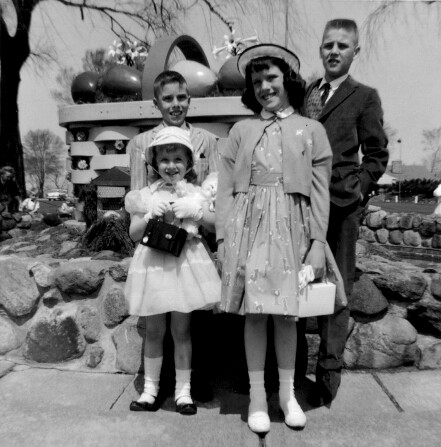Thursday, the night of the Last Supper, meant visits to seven churches, easily accomplished in my heavily Catholic hometown. Good Friday was a solemn day -- no school, more church, but with a twist: all the statues were shrouded in purple robes except for a gory-to-my-eyes, life-like crucifix laid on the steps to the altar. Adults would kiss the hands and feet, where nails pierced the wooden flesh. I stayed far away.
Things lightened up on Saturday for the blessing of the food. We went -- again -- to church, this time cradling baskets containing my grandmother's homemade kielbasa, horseradish, colored eggs, a butter lamb, and other items whose names I could pronounce but can't begin to spell. The odor of the food blended with residue of musky incense for a festive traditional stink. No chocolate, jelly beans, or Peeps; those made their appearance on Sunday after we hunted them down in the places the Easter Bunny had hidden them.
Hats. We had hats. Women (and girls) had to cover their heads in church, so Easter outfits included hats. And corsages. My mother picked out my hat; my dad got the corsages. My corsage would have a pipe-cleaner bunny among the carnations.
I remember it well.
Or do I?
Many people think of memory as a video recorder, an incontrovertible record of events. Science, however, says that's not the case. In a recent study, more than 5,000 participants were presented with doctored photographs representing fabricated political events, with around half claiming to remember the false scenarios. The study, part of a decades-long program of research by psychologist Elizabeth Loftus, provides "a neat demonstration of how our memories are created in the present rather than being faithful records of the past," Time reports.

Memory is a complex mental function, tied to imagination, and there are many ways it can go wrong, scientists say. The bigger question is, why are we so attached to our idea of memories as fixed, unchanging possession? Time writes:
There are many reasons, but one is that memories are foundational for our sense of self. This is particularly true for early childhood memories (which the scientists tell us are the most unreliable of all). In her striking description of lying as a small child in her cot at St. Ives, Virginia Woolf noted that this wasn’t just her earliest memory; it was the moment she became the person (and the writer) she was. It is no wonder that we resist the idea that our memories are collages of disparate sources of information, assembled and reassembled long after the event.
Buddhists have long known that memories are ineffable and ephemeral. Mindfulness meditation -- as taught by the Buddha and updated by any number of scientists in the last 40 years -- is a practice to help us stay in the present moment, knowing that ruminating over the past or worrying about the future leads to suffering.
“Do not dwell in the past, do not dream of the future, concentrate the mind on the present moment.” -- Buddha
And yet, Buddhism also proposes that we carry the effects of past actions in our karma. Our
unexamined actions create habitual patterns, and we react from habit, not from what we see before us. Our view of the world -- whether it is safe, friendly, satisfying, beautiful -- is formed in large part by the views of our parents and caregivers, and the culture we grow up in. If we are raised to be suspicious of strangers, we carry that with us into encounters -- unless we examine our habitual thoughts pattern and practice changing them. (Teacher Tyler Dewar details ways karma can be purified in this article.)
We also carry around the idea that a self, an independent and unchanging being, was forged by these memories. But if we simply look closely at the people we were in those photographs and compare them to who we are now, we can see that we've changed. We're bigger. Our likes and dislikes have changed. Time writes:
Bracing as it might be, this new way of thinking about memory does not have to lead to self-doubt. It simply requires that we take our memories with a pinch of salt, and forge new relationships with them. They may be a kind of fiction, but the manner of their making speaks volumes about those who create them.... Whether the events happened or not, your biases and beliefs shape the kind of memories you form, and thus reveal the kind of person you are.PS. Easter Monday is Dyngus Day. In my youth, it was said that the boys would tap the girls with pussy willow branches, and the girls would hit the boys with socks filled with flour in a bastardized version of an ancient fertility rite. Today, it's gender neutral.




No comments:
Post a Comment